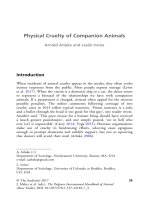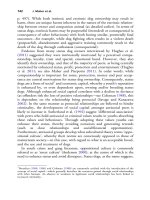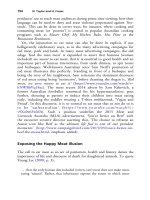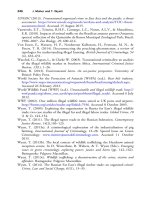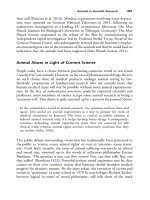The palgrave international handbook of a 107
Bạn đang xem bản rút gọn của tài liệu. Xem và tải ngay bản đầy đủ của tài liệu tại đây (25.83 KB, 1 trang )
Animal Neglect
97
purchase of an animal) and those responsible for an animal by virtue of being
the provider of food or shelter, even if only temporarily. Thus, those housesitting for a non-human companion while owners are absent are temporarily
bound by the requisite duty of care. The duty to ensure welfare enshrined in
the Animal Welfare Acts requires that owners or those responsible for an
animal should provide for: (1) a suitable environment, (2) a suitable diet, (3)
the need to be able to exhibit normal behaviour patterns, (4) any need to be
housed with or apart from other animals and (5) the need for protection
from pain. The legislation thus departs from previous simplified prohibitions
on unnecessary suffering which commonly defined this in practice as physical
cruelty, to provide for a broader definition which includes mental distress
and emotional harm linked to consideration of each non-human companion’s individual needs. Donaldson and Kymlicka have argued for a change
in the status of companion animals such that ‘domesticated animals must be
seen as members of our community’ (2011, p. 101). They contend that a
notion of animal citizenship should provide relational rights for animal
citizens reflecting the preferences and desires of animals which includes
freedom of movement and the sharing of public space, duties of protection
and effective medical care tailored to the needs of the individual (animal)
citizen (2011, pp. 126–142). Nurse and Ryland (2013, 2014) identify that
under the Animal Welfare Act 2006 those responsible for non-human
companions are required to do more than simply provide a home for their
companion. In their assessment of the Act and DEFRA’s Code of Practice for
the Welfare of Cats they identify that owners and ‘responsible persons’ (those
looking after a companion) are required to consider both the interior and
exterior environment of their home and to ensure that, so far as is possible, it
is suitable for the individual companion (Nurse and Ryland 2013, pp. 9–10).
They identify that where owners and responsible persons fail to do so, they
may commit an offence under the Animal Welfare Act 2006. Contemporary
UK legislation therefore explicitly provides for a strong principle of animal
welfare with prison sentences for ‘general’ offences.
While not fully achieving Donaldson and Kymlicka’s (2011) notion of
actual citizenship, this conception of the need to consider the individual
characteristics of a companion arguably broadens the notion of companion
animals as active participants in a home rather than the historical conception
of non-human companions solely as ‘pets’. Both the physical and psychological needs of the individual companion animal need to be considered as UK
legislation on non-human companions has changed from its original conception of preventing ‘unnecessary suffering’ which historically meant avoiding cruelty to ‘provide for a broader definition [of suffering] which includes
